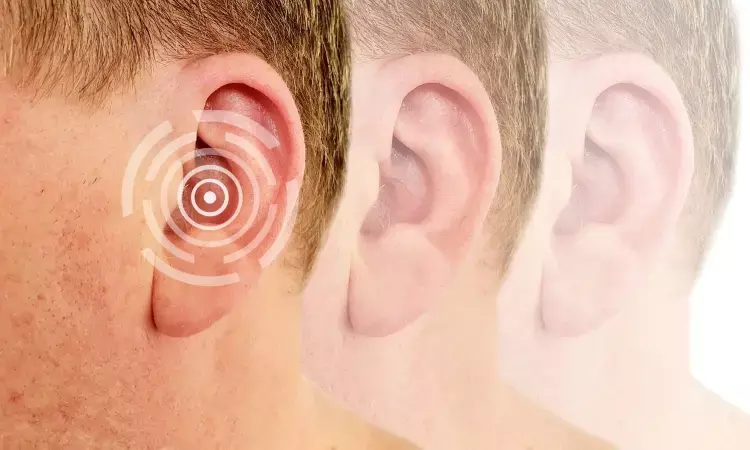- Home
- Medical news & Guidelines
- Anesthesiology
- Cardiology and CTVS
- Critical Care
- Dentistry
- Dermatology
- Diabetes and Endocrinology
- ENT
- Gastroenterology
- Medicine
- Nephrology
- Neurology
- Obstretics-Gynaecology
- Oncology
- Ophthalmology
- Orthopaedics
- Pediatrics-Neonatology
- Psychiatry
- Pulmonology
- Radiology
- Surgery
- Urology
- Laboratory Medicine
- Diet
- Nursing
- Paramedical
- Physiotherapy
- Health news
- Fact Check
- Bone Health Fact Check
- Brain Health Fact Check
- Cancer Related Fact Check
- Child Care Fact Check
- Dental and oral health fact check
- Diabetes and metabolic health fact check
- Diet and Nutrition Fact Check
- Eye and ENT Care Fact Check
- Fitness fact check
- Gut health fact check
- Heart health fact check
- Kidney health fact check
- Medical education fact check
- Men's health fact check
- Respiratory fact check
- Skin and hair care fact check
- Vaccine and Immunization fact check
- Women's health fact check
- AYUSH
- State News
- Andaman and Nicobar Islands
- Andhra Pradesh
- Arunachal Pradesh
- Assam
- Bihar
- Chandigarh
- Chattisgarh
- Dadra and Nagar Haveli
- Daman and Diu
- Delhi
- Goa
- Gujarat
- Haryana
- Himachal Pradesh
- Jammu & Kashmir
- Jharkhand
- Karnataka
- Kerala
- Ladakh
- Lakshadweep
- Madhya Pradesh
- Maharashtra
- Manipur
- Meghalaya
- Mizoram
- Nagaland
- Odisha
- Puducherry
- Punjab
- Rajasthan
- Sikkim
- Tamil Nadu
- Telangana
- Tripura
- Uttar Pradesh
- Uttrakhand
- West Bengal
- Medical Education
- Industry
Personal sound amplification device improves communication function in elderly with hearing loss: JAMA

USA: A hearing care intervention consisting of a community health worker-delivered personal sound amplification device significantly improved self-perceived communication function at three months compared with wait-list control in older adults with hearing loss, a recent study has stated. The study appeared in the Journal of the American Medical Association (JAMA).
Age-related hearing loss that hinders daily communication is linked with adverse health outcomes, but hearing aids use among older adults is low, and some disparities exist. Considering this, Carrie L. Nieman from Johns Hopkins University School of Medicine in Baltimore, Maryland, and colleagues aimed to determine whether an accessible, affordable hearing care intervention, distributed by community health workers through over-the-counter hearing technology, could improve self-perceived communication function in older adults with hearing loss versus a wait-list control.
For this purpose, the researchers conducted an open-label randomized clinical trial between April 2018 and October 2019, with the completion of a 3-month data collection in June 2020. The trial was held at 13 community sites, inclusion senior centres (n = 2), affordable independent housing complexes (n = 10), and an older adult social club (n = 1) in Baltimore, Maryland.
One hundred fifty-one participants aged 60 years or older with hearing loss were randomized. The 2-hour intervention comprised fitting a low-cost amplification device and instruction. Seventy-eight received a community health worker–delivered hearing care intervention, and 73 were to a wait-list control group.
Change in the self-perceived communication function (primary outcome) was assessed from the Hearing Handicap Inventory for the Elderly–Screening Version [HHIE-S]; the score ranges from 0-40; higher scores suggest poorer function from baseline to 3 months post-randomization. The average treatment effect was estimated.
From 151 randomized participants (mean age, 76.7 years; 67.8% women), 90.1% (n=136) completed a 3-month follow-up for the primary outcome.
Following were the study's key findings:
- 90.5% completed the intervention session in the intervention group and reported at least 1 hour of daily amplification use at three months post-randomization.
- Mean scores for the HHIE-S were 21.7 at baseline and 7.9 at three months in the intervention group, 20.1 at baseline and 21 at three months in the control group.
- Self-perceived communication function remarkably improved in the intervention group versus the control group, with an approximate average treatment effect of the intervention of a change in –12.98-point HHIE-S.
- No study-related adverse events were reported.
"We found that a community health worker–delivered personal sound amplification device intervention remarkably improved self-perceived communication function at three months in older adults with hearing loss," the authors wrote.
"The absence of sham control limits findings, and there is a need for further research to understand effectiveness compared with other types of amplification devices and care delivery model," they concluded.
Reference:
Nieman CL, Betz J, Garcia Morales EE, et al. Effect of a Community Health Worker–Delivered Personal Sound Amplification Device on Self-Perceived Communication Function in Older Adults With Hearing Loss: A Randomized Clinical Trial. JAMA. 2022;328(23):2324–2333. doi:10.1001/jama.2022.21820
Dr Kamal Kant Kohli-MBBS, DTCD- a chest specialist with more than 30 years of practice and a flair for writing clinical articles, Dr Kamal Kant Kohli joined Medical Dialogues as a Chief Editor of Medical News. Besides writing articles, as an editor, he proofreads and verifies all the medical content published on Medical Dialogues including those coming from journals, studies,medical conferences,guidelines etc. Email: drkohli@medicaldialogues.in. Contact no. 011-43720751


